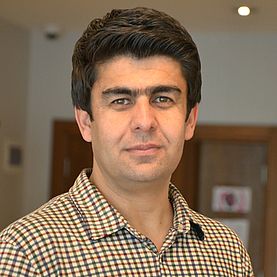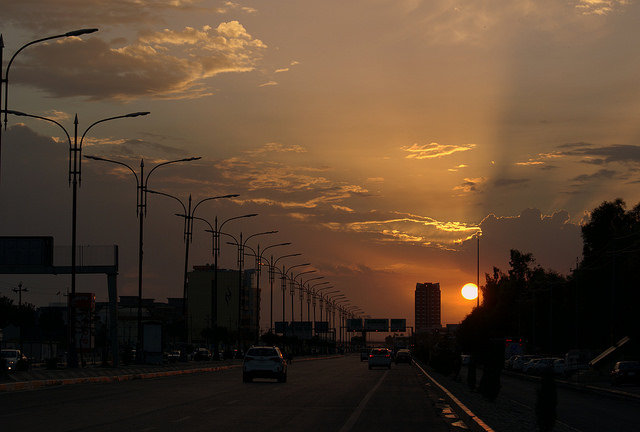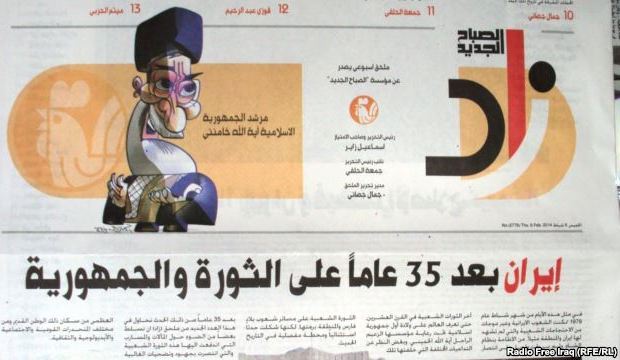Index relies entirely on the support of donors and readers to do its work.
Help us keep amplifying censored voices today.
Open Shutters Iraq, in which photographs and photographic essays made by women from Baghdad, Basra, Falluja, Kirkuk and Mosul, is launched. Women tell their stories of war, sanctions, intifada, siege, kidnapping, grief, love, happiness, times of resistance, achievements and small triumphs through these images and essays. The project is later compiled into a book.
[vc_row][vc_column][vc_column_text]This article is part of Index on Censorship partner Global Journalist’s Project Exile series, which has published interviews with exiled journalists from around the world.[/vc_column_text][vc_column_text]

Kamal Chomani
Iraq’s autonomous Kurdish region has long had a reputation in the west as a bastion of stability in a chaotic region plagued by religious and ethnic tension. Yet despite the oil-rich region’s close ties to the U.S. and billions of dollars in foreign investment, Iraqi Kurdistan is no easy place to be a journalist.
One example of this is the experience of journalist and blogger Kamal Chomani. Chomani, who wrote for local and international news outlets including the Kurdistan Tribune and Al-Monitor, was a frequent critic of Kurdistan’s two entrenched parties: the Kurdish Democratic Party (KDP) of regional President Nechirvan Barzani, and the Patriotic Union of Kurdistan (PUK) of former Iraqi president Jalal Talabani.
Chomani had been threatened as far back as 2011, when he escaped abduction by Kurdish security forces intent on quashing dissent during the Arab Spring by sprinting into a supermarket. Yet it was not until political tensions spiked again in 2017 during Iraqi Kurds’ independence referendum, a vote Chomani had criticised and that the international community did not recognise, that he felt his situation had become untenable.
“There were death threats every day on social media and messages labeling me as a traitor,” he says, in an interview with Global Journalist.
Chomani, who lived in the Kurdish region’s capital Erbil, realised he either had to quit criticising the Kurdish leadership or leave. With the help of Germany’s Hamburg Foundation for Politically Persecuted People, he left last year.
A former correspondent for the press freedom group Reporters Without Borders, the 34-year-old is now a nonresident fellow with the Tahrir Institute for Middle East Policy and lives in Hamburg. He told his story to Global Journalist’s Franziska Stadlmayer. Below, an edited version of their conversation:[/vc_column_text][/vc_column][/vc_row][vc_row][vc_column][vc_column_text]
Global Journalist: Tell us about your work in Iraqi Kurdistan.
Kamal Chomani: When the Kurdistan region was founded in 1991 and recognized by Iraq in 2003, many Kurdish youth, writers and journalists were not satisfied with the political system. We thought our dreams of freedom and justice had been stolen.
I was one of those young Kurds who tried to push reforms and make our dreams come true. For example, in Kurdistan we have no national army or national security forces. We have these forces that are linked to the political parties and two families. The Peshmerga [militia] forces fought for freedom before 1991 but turned against the people after the liberation of Kurdistan. For me as a journalist and Kurd this is not acceptable.
I have written about this and the misconduct of the ruling parties. During the fake referendum on independence, I criticized why the referendum should not be held at this time. This was not accepted by the ruling [KDP] party and I was called a traitor, like many other friends at home and abroad. I also criticized the oil policy of the Kurdish regions, which is more the policy of the KDP because it serves the government and the [ruling] families more than the region.
GJ: What kind of intimidation did you experience?
Chomani: Sometimes you just got phone calls – you don’t know from whom. And sometimes people tell you indirectly that writing this will eventually put your life in danger.
Sometimes, the security forces knock at your door at 11 p.m. For instance, [one evening] I had guests at my home at 11 p.m. The security forces came to home, forcing the guests to leave my house.
Sometimes it is a kidnapping attempt. I have some [sources] within the institutions and those people warned. They’d contact you to meet you secretly and tell you something is going on: that you should take care of yourself, that you should not use your car, always be guarded by your friends or your family…I was given such kind of warning before, but I never took that seriously until during the [2017] referendum. This time, I was very much afraid to be targeted.
GJ: They also tried to kidnap you?
Chomani: A few times. The last time before I came here was probably in March 2018. There was a protest in [the town of] Choman and I was there as a journalist. The protesters were about 50 teachers and [government] employees who demanded their salaries because the government had not paid them for months. I wanted to report and be a voice for them. But then the head of the security forces of the KDP came to me, and called me the person behind the protest.
The leader of the Asayhish [security agency] took my hand…he told me to either leave or they would beat me very terribly.
Then he started pulling my hands and took me with him while two other guys, bodyguards, came. The demonstrators held my belt from behind and started shouting against the Asayhish guys. They began to shout that they were ready to fight back. When people realized that something very serious was going on, other people came because their family members were there. I was lucky [the security agents] couldn’t take me with them.
GJ: Was that the only time?
Chomani: In 2011, I was with a colleague in Erbil and we were meeting a high official of Kurdistan, just to discuss what is going on in the region. But there were some people following me and my friend and they tried to kidnap us.
They stopped their car very fast, came out and told me: “Hey man, come with us.”
They had Kalashnikovs, big sticks and pistols in hand.
We ran away and we were lucky. They chased us running but they could not hurt us because there were people in the street. Somehow we got to a supermarket almost 100 meters away. When people came out of the supermarket, we were able to go in, into the crowd, and they stopped.
That was in 2011 during the Arab Spring when the KDP and the PUK were kidnapping some activists – critics and journalists. They were taking them outside the city, beating them to death and then throwing them somewhere. This happened to several people…2011 was a dark time.
GJ: Why did you leave Iraqi Kurdistan?
Chomani: Since 2006 I have been a critical journalist writing about freedom of speech, corruption in the oil sector, democracy and human rights violations – also about the nationalist rhetoric of the KDP and the crimes the KDP and PUK committed during the [1994-1998] civil war. This has not been accepted easily…I was able to resist all those years of death threats and kidnapping attempts.
But during the referendum in 2017, I was more vocal. We were very few people inside the Kurdistan region who had a critical view towards the referendum – against the timing and the legality and the purposes. We were labeled a group of traitors.
There were death threats every day on social media and messages labeling me as a traitor. If I stayed in the Kurdistan region, my life would have been at risk. I would have had to stop writing critically or comprise on what I believe in. Therefore I decided to leave…better to be exiled abroad than feeling exiled at home.
GJ: How did you do that?
Chomani: I reached to some international organizations [to tell them] that I needed a break. Reporters Without Borders got in touch with one of the organizations here in Germany, it’s called the Hamburg Foundation for Politically Persecuted People. It’s a program that gives one year of scholarship here in Hamburg and during this year you will be able to continue your work while living in a safe place. I am going to do a master’s program soon and return with more knowledge.
[/vc_column_text][/vc_column][/vc_row][vc_row][vc_column width=”1/2″][vc_video link=”https://youtu.be/6BIZ7b0m-08″][/vc_column][vc_column width=”1/2″][vc_column_text]Index on Censorship partner Global Journalist is a website that features global press freedom and international news stories as well as a weekly radio program that airs on KBIA, mid-Missouri’s NPR affiliate, and partner stations in six other states. The website and radio show are produced jointly by professional staff and student journalists at the University of Missouri’s School of Journalism, the oldest school of journalism in the United States. [/vc_column_text][/vc_column][/vc_row][vc_row][vc_column][vc_custom_heading text=”Don’t lose your voice. Stay informed.” use_theme_fonts=”yes”][vc_separator color=”black”][vc_row_inner][vc_column_inner width=”1/2″][vc_column_text]Index on Censorship is a nonprofit that campaigns for and defends free expression worldwide. We publish work by censored writers and artists, promote debate, and monitor threats to free speech. We believe that everyone should be free to express themselves without fear of harm or persecution – no matter what their views.
Join our mailing list (or follow us on Twitter or Facebook). We’ll send you our weekly newsletter, our monthly events update and periodic updates about our activities defending free speech. We won’t share, sell or transfer your personal information to anyone outside Index.[/vc_column_text][/vc_column_inner][vc_column_inner width=”1/2″][gravityform id=”20″ title=”false” description=”false” ajax=”false”][/vc_column_inner][/vc_row_inner][/vc_column][/vc_row][vc_row full_width=”stretch_row_content”][vc_column][three_column_post title=”Global Journalist / Project Exile” full_width_heading=”true” category_id=”22142″][/vc_column][/vc_row]

Erbil, Iraq. Photo: Alan Farhadi/Flickr
Foreign correspondents often rely on “fixers” to help them report from war-torn countries. But, as Caroline Lees reveals in the new issue of Index on Censorship magazine, they can be targeted as spies if their names become known locally.
In this clip one Iraqi fixer, who has worked with foreign media ranging from Vice to National Geographic, tells Index about the gamble he takes on each byline with IS territory just an hour away.
Order your full-colour print copy of our anonymity magazine special here, or take out a digital subscription from anywhere in the world via Exact Editions (just £18* for the year). Each magazine sale helps Index on Censorship fight for free expression worldwide.
*Will be charged at local exchange rate outside the UK.
Copies will be available at the BFI, the Serpentine Gallery, MagCulture, (London), News from Nowhere (Liverpool), Home (Manchester), Calton Books (Glasgow) and on Amazon. Each magazine sale helps Index on Censorship continue its fight for free expression worldwide.

Al-sabah al jadeed’s caricature of Ayatollah Khamenei (Image RFE/RL)
Independent Iraqi daily newspaper Al-Sabah Al-Jadeed has survived numerous attempts to destroy it over its 10 year existence. But on 10 February, the newspaper’s Baghdad office was bombed and now its future is in doubt. The daily may need to find a new office, employees are fleeing, and its website is facing one DoS attack after another.
Windows, furniture and equipment were damaged when a bomb went in front of the building at 4.30 am. Later that morning another bomb exploded not far from the newspaper, while an unexploded heavy C4 plastic explosive device was found inside the premises and dismantled by police. No one was injured or killed, as the office was empty – but some neighbours are suggesting that the newspaper should move.
A few hours later that same day a militia-like group entered the building. “They came threatening us in broad daylight, so to speak,” says Ismael Zayer, editor in chief. The group escaped after employees managed to warn the police.
The bomb attacks followed a social media campaign to demand the closure of the newspaper after it published its weekly supplement Zad on 6 February. The supplement was devoted to the 35th anniversary of the Islamic Revolution in Iran and on the cover featured a caricature of Iran’s supreme leader, Ayatollah Ali Khamenei. The cover caricature is a tradition for Zad, a supplement that came into existence in the first months of the Arab Spring. Ahmed al-Rubaie, the newspaper’s cartoonist, has drawn hundreds of caricatures of political and religious figures, from Iraqi president Jalal Talabani, Najaf’s grand ayatollah Al-Sistani and prime minister Nouri al-Maliki to Nelson Mandela and other internationally known figures. These cartoons are never intended to be offensive or convey a negative message, they are just an alternative to uninteresting photos of VIPs.
Zayer believes the caricature of Khamenei is just a pretext to attack the newspaper and have it closed before the parliamentary elections planned for this spring. But there may be yet more reasons for the attacks and threats against the newspaper. Al-Sabah Al-Jadeed recently covered a damning report by Human Rights Watch on the abuse of female detainees in Iraqi prisons. HRW accused the government of illegally detaining wives and daughters of (Sunni) suspects who are on the run, claiming detainees were sexually abused. Zayer wrote an open letter to the government, demanding that the Minister of Justice, Hassan al-Shimmari, be sacked. “I am ashamed of my country,” he commented, “What are we? A whorehouse?”
After some efforts to convince the Ministry of Interior to protect the newspaper and its staff, the office of the newspaper is now under permanent surveillance by the police, but it is unclear for how long. Zayer has left the country temporarily after receiving death threats. This is not the first time the editor has been forced to flee Baghdad.
In the beginning of 2006 when Iraq’s sectarian conflict led to thousands of assassinations a month, Zayer managed the newspaper from a small office in Amman, Jordan. He planned to create an international edition for the millions of Iraqi refugees outside their home country – a project that was almost ready to be launched when on 30 December, Saddam Hussein was hanged in a way that scandalised his Jordanian supporters and made the company that was going to produce the international edition wary of printing a newspaper critical of Ba’athists.
Zayer decided to open a second bureau in Erbil, the relatively safe capital of the autonomous Kurdish Region, and to bring back around a dozen journalists that had escaped to neighbouring Jordan, Lebanon and Syria. The bureau was maintained until the very end of 2009, when Zayer and most of his staff went back to Baghdad.
The newspaper has faced many other challenges. In May 2004, Zayer’s driver and bodyguard were killed during an attempt by fake police to kidnap the editor in chief. Later, one of Zayer’s brothers was kidnapped for a hefty ransom. More than once ministers ordered an advertising boycott – a large part of the advertising in the newspaper concerns government tenders, next to a steady stream of ads by mobile phone companies and real estate firms. Nowadays, a strange rule is in force that says tender ads can only be paid once the tender has been decided – as a result, the newspaper is sitting on hundreds of unpaid bills.
From 2006 until 2008, when Nouri al-Maliki, after having been under siege in Basra himself, finally decided to defeat the Shi’ite militias in the south and the capital, distribution of the newspaper was often prohibited in many cities and Baghdadi neighbourhoods. Distribution north of the capital was completely disrupted during the American siege of Fallujah at the end of 2004 – and for a long time thereafter. The Borsa in Baghdad, a building from where for years, several independent and party newspapers were sold to traders every morning, was occupied for months by Ba’athists. Sometimes printing houses ran out of paper after trucks were stolen on the road from Amman to Baghdad and their drivers killed.
By attempting to create a modern, democratic trade union for journalists, Zayer, who was elected its first president, ran into serious trouble with the old union, one of the many Ba’athist institutions the US occupation’s administration had left intact.
The newspaper has survived several libel cases brought on by various politicians demanding potentially ruinous compensation sums, owing its victories to courageous independent judges. It has survived vicious campaigns on the internet claiming it is in “American-Zionist” hands. Recently it survived the flooding of large parts of Baghdad, as a result of bad maintenance of the sewage system and torrential rain.
Iraqi readers have shown their support for the newspaper after the bomb attack. This February is not the first time there is no Al-Sabah Al-Jadeed in the streets – but this time, as those responsible for the bomb attack didn’t leave a business card, with whom should the newspaper negotiate? Removing the supplement from the website hasn’t helped to assuage the anger about the innocent caricature of Khamenei. In the past the newspaper could hang on thanks to financial help from donors, as well as political support from Iraqi ministers and top officials who think independent media are at least a necessary evil. It certainly needs solidarity now.
This article was published on 13 February 2014 at indexoncensorship.org